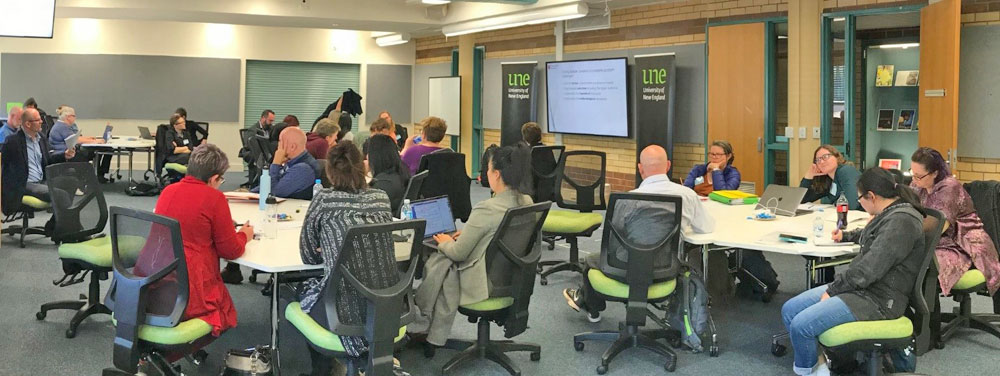By Chris Campbell (Griffith University) & Sue Gregory (University of New England)
The Spring into Excellence Research School was introduced and launched in 2017 as an initiative by the current ASCILITE President Dominique Parrish. In 2019 the Research School was led by Associate Professor Sue Gregory (ASCILITE Executive, UNE), Dr Chris Campbell (ASCILITE Executive and Vice President, Griffith), Dr Thom Cochrane (ASCILITE Executive, AUT), Michael Henderson (Monash), Barney Dalgarno (CSU) and Pep Serow (UNE).
This year the Research School was introduced by Professor Jonathon Powles (Pro Vice Chancellor Academic Innovation, UNE) at the University of New England, Armidale, and was conducted from 2 – 4 September 2019. In total, 26 participants from 8 institutions from across Queensland, NSW, Victoria and South Australia as well as from New Zealand participated in the School. This included 15 participants from UNE who came from a broad range of disciplines.
ASCILITE members were initially invited to submit Expressions of Interest in June 2019 to attend the Research School, which resulted in 36 applications. Successful applicants were provided details on how to register in July 2019. The host and sponsoring institution, the University of New England was offered 16 complimentary places. The 3-day school included lunch on the Tuesday and Wednesday as well as morning and afternoon teas and two nights’ accommodation as part of the modest registration fee. ASCILITE members were offered a discount on the enrolment fee over non-members. There was also a further reduction in cost for those who did not require accommodation.

The aim of the ASCILITE Spring into Excellence Research School was to:
- Provide support and guidance to participants in developing and progressing Technology Enhanced Learning (TEL) research initiatives including but not limited to:
– Formulating a relevant and effective TEL research project.
– Collecting appropriate TEL research data.
– Identifying what data is most appropriate for TEL research. - Assist participants to identify and plan a contemporary TEL research project.
- Enable opportunities for participants to link with like-minded collaborators from other universities and potentially to establish viable cross-institutional research collaborations.
- Guide participants in developing a grant application or research plan for a TEL research project. This would include both projects that have already been conceptualised as well as new projects that have not yet been conceived.
At this year’s School, participants undertook the following activities:
- Participants were given the opportunity to commence development of their own research, including research aims, objectives and research questions that they wanted to explore.
- Explored various TEL research methodologies and methods as well as research terminology used across various types of research designs, particularly related to TEL research.
- Discovered a range of approaches for collecting data and methods that could be used in data collection – qualitative, quantitative or mixed methods as well as how data analysis might transpire once data has been collected. Participants then had the opportunity to identify and refine data collection strategies for their own research and think about some of the common research theories that are used in TEL research.
- Presented with suggestions and opportunities for research funding including potential funding currently available. Participants were encouraged to seek institutional and internal grants before moving to the external national/international funding opportunities.
- Considered how their personal academic profiles could be enhanced with strategies presented on how to maximise digital reach through ORCID, Academia and ResearchGate.
- Discussed how to disseminate research findings as well as how to successfully submit and publish journal articles.

Throughout the Research School, both participants and facilitators had the opportunity to network over lunch, during breaks and at arranged dinners on both evenings.
There were a total of 19 participants who completed the Research School evaluations with participants agreeing the Research School activities were useful in helping them to formulate a relevant TEL research project with a mean of 4.26 (out of 5). They felt that the organisation of the activities were appropriate with a mean of 4.47 and the Research School was successfully facilitated with a mean of 4.53. Participants felt they had an adequate opportunities to contribute (4.63), and also indicated that they would tell others about the Research School initiative (4.58). One participant commented “an excellent, well-run and informative workshop with lots to unpack” while another stated “Michael’s presentation was a highlight for me, thanks!”. One person stated they found the most useful on days one and three “starting the research process, and then the journal/publication and grant writing sections. I loved hearing from Pep Serow – it made the research process real”.
Presenters and Facilitators
- Dr Chris Campbell, Lecturer in Learning Innovation in Learning Futures, Griffith University (ASCILITE Executive)
- Associate Professor Sue Gregory, ASCILITE Executive, Head of School (School of Education, Faculty of HASSE)
- Professor Barney Dalgarno, Deputy PVC Division of Learning and Teaching, Charles Sturt University (ASCILITE Life Member)
- Associate Professor Michael Henderson, Educational Technologies, Monash University (Chief Editor – AJET)
- Dr Thom Cochrane, Academic Advisor and Senior Lecturer in Educational Technology, Auckland University of Technology (ASCILITE Executive and AJET Editor)
- Associate Professor Pep Serow, Project Leader of the Nauru Teacher Education Project, Mathematics Education, University of New England (School of Education, Faculty of HASSE)
The event made the Armidale Express newspaper: https://www.armidaleexpress.com.au/story/6369903/teaching-through-technology-une-hosts-research-school/?cs=471
We are hoping that the next Research School will be conducted in a southern state in 2020.
